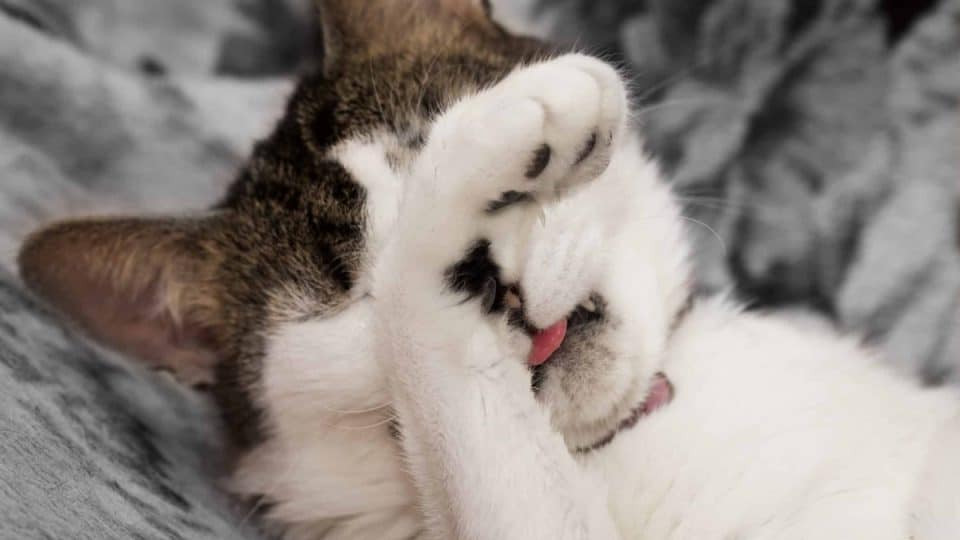Table of Contents
Written By Chantelle Pattemore Rover
Chances are you notice that your cat spends a lot of time grooming. In fact, according to Cornell University College of Veterinary Medicine, cats spend up to 50% of their days cleaning and licking themselves. Yet, despite their dedication to cleanliness, our cats can still smell bad. Cats may stink for many reasons, ranging from natural scents and bad breath to infections or digestive issues.
Let’s look at the factors that lead to nasty smelly cats and how pet parents can tackle them.
Cat Mouth Smells
Dental disease
Cavities, decay, and gum inflammation can affect felines and cause unpleasant odors. In addition, cats can experience bad breath from an inflammatory oral health condition called ‘stomatitis.‘
Brushing your cat’s teeth (yes, it is possible!) or giving them mouth-friendly treats can help prevent dental diseases.
Ulcers or lesions
One of the leading causes of ulcers and lesions in cats is a nasty condition called feline chronic gingivostomatitis. Aside from sore and bleeding lesions, another symptom is bad breath. This occurs “because the oral inflammation makes the cat susceptible to bacterial infections of the mouth,” explains Louis DelGiudice, DVM, DACVECC, National Emergency Specialty Director at AmeriVet Veterinary Partners.
Dental disease, environmental stress, and a weak immune system can trigger feline chronic gingivostomatitis.
Cat Rear End Smells
Farting
Like humans, cats fart (although usually not as frequently). A couple of the leading causes of gas in felines are digestive upset or swallowing too much air.
Diarrhea
If your cat’s feces looks runny or very soft, it’s likely a sign of diarrhea. You’ll also notice that it smells awful. It usually occurs when your cat eats something that upsets their stomach and often passes within a day or two. But, speak with your vet if it lasts longer, as it can sometimes indicate something more serious.
Anal gland secretion
Cats use scent to mark their territory. One of the ways they release this scent is through the little glands close to their anus. The scent has a very unappealing odor, so you’ll know when it’s been discharged. These anal sac scents, while unpleasant smelling, are an important way for cats to provide information about their age, sex, and reproductive availability.
Perianal fistulas
Perianal fistulas are red, painful lesions in the tissues around the anus. DelGuidice reveals that these “can lead to a foul odor due to tissue infection.” This condition is as unpleasant as it sounds — but, fortunately, DelGuidice says they are uncommon in cats.
Cat Ear Smells
Ear infections
All ear infections can cause a foul odor, states DelGuidice. However, the odor and severity vary based on the type of bacteria or yeast present. Otitis externa, for example, causes inflammation, discharge, and foul odors in the ear canal.
Want to keep ears clean and free from infection and smelly odors? Cat-friendly ear-cleaning products are available to assist with the task.
Ear mites
Ear mites can cause significant problems for cats. When they burrow deep into a feline’s ears, these parasites create a mess of wax and other debris. And, you guessed it, this can smell pretty bad. Unfortunately, cat ear mites won’t go away on their own, so you’ll need to pay a visit to your vet to get them sorted out.
Skin Infections & Wounds
Everything from bacteria overgrowth, to wounds, to allergies can cause problems for a cat’s skin. When left untreated, these may become infected — especially if your feline licks or paws at the area — and lead to nasty-smelling discharges.
Will A Urinary Tract Infection Make My Cat Smell?
When cats get urinary tract infections (UTIs), DelGuidice explains the urine may also have a foul smell. Furthermore, DelGuidice states that UTIs can lead to skin infections of the genital region that can cause odors.
During a UTI, cats might experience symptoms such as painful and increased urination, blood in the urine, and excessive licking of the genitals. Urinary tract infections in cats happen for various reasons, including bacterial infection, stress, behavioral issues, and urinary stones.





